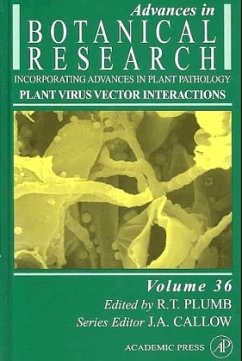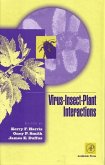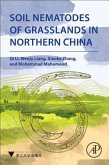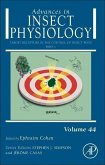Most viruses that infect plants need an intermediary (vector) for their spread between plants. This book describes, for the main vector groups, the current state of knowledge of what happens to viruses in their passage through their vectors and what interactions within the vector determine whether or not they are passed on to new plants. This volume of Advances in Botanical Research brings together current research on virus-vector interactions, with chapters on aphids, fungi, whitefly, beetles, nematodes, thrips, leafhoppers, treehoppers, and planthoppers, and other vectors.
Advances in Botanical Research is a multi-volume publication that brings together reviews by recognized experts on subjects of importance to those involved in botanical research. First published in 1963, Advances in Botanical Research has earned a reputation for excellence in the field for more than thirty years. In 1995, Advances in Botanical Research was merged with Advances in Plant Pathology to provide one comprehensive resource for the plant science community, with equal coverage of plant pathology and botany in both thematic and mixed volumes.
Now edited by J.A. Callow (University of Birmingham, UK), supported by an international Editorial Board, Advances in Botanical Research publishes in-depth and up-to-date reviews on a wide range of topics which will appeal to post-graduates and researchers in plant sciences including botany, plant biochemistry, plant pathology and plant physiology. Eclectic volumes in the serial are supplemented by thematic volumes on such topics as Plant Protein Kinases, and Plant Trichomes.
In 1999, the Institute for Scientific Information released figures showing that Advances in Botanical Research has an Impact Factor of 4.378, placing it 8th in the highly competitive category of Plant Sciences.
Advances in Botanical Research is a multi-volume publication that brings together reviews by recognized experts on subjects of importance to those involved in botanical research. First published in 1963, Advances in Botanical Research has earned a reputation for excellence in the field for more than thirty years. In 1995, Advances in Botanical Research was merged with Advances in Plant Pathology to provide one comprehensive resource for the plant science community, with equal coverage of plant pathology and botany in both thematic and mixed volumes.
Now edited by J.A. Callow (University of Birmingham, UK), supported by an international Editorial Board, Advances in Botanical Research publishes in-depth and up-to-date reviews on a wide range of topics which will appeal to post-graduates and researchers in plant sciences including botany, plant biochemistry, plant pathology and plant physiology. Eclectic volumes in the serial are supplemented by thematic volumes on such topics as Plant Protein Kinases, and Plant Trichomes.
In 1999, the Institute for Scientific Information released figures showing that Advances in Botanical Research has an Impact Factor of 4.378, placing it 8th in the highly competitive category of Plant Sciences.








